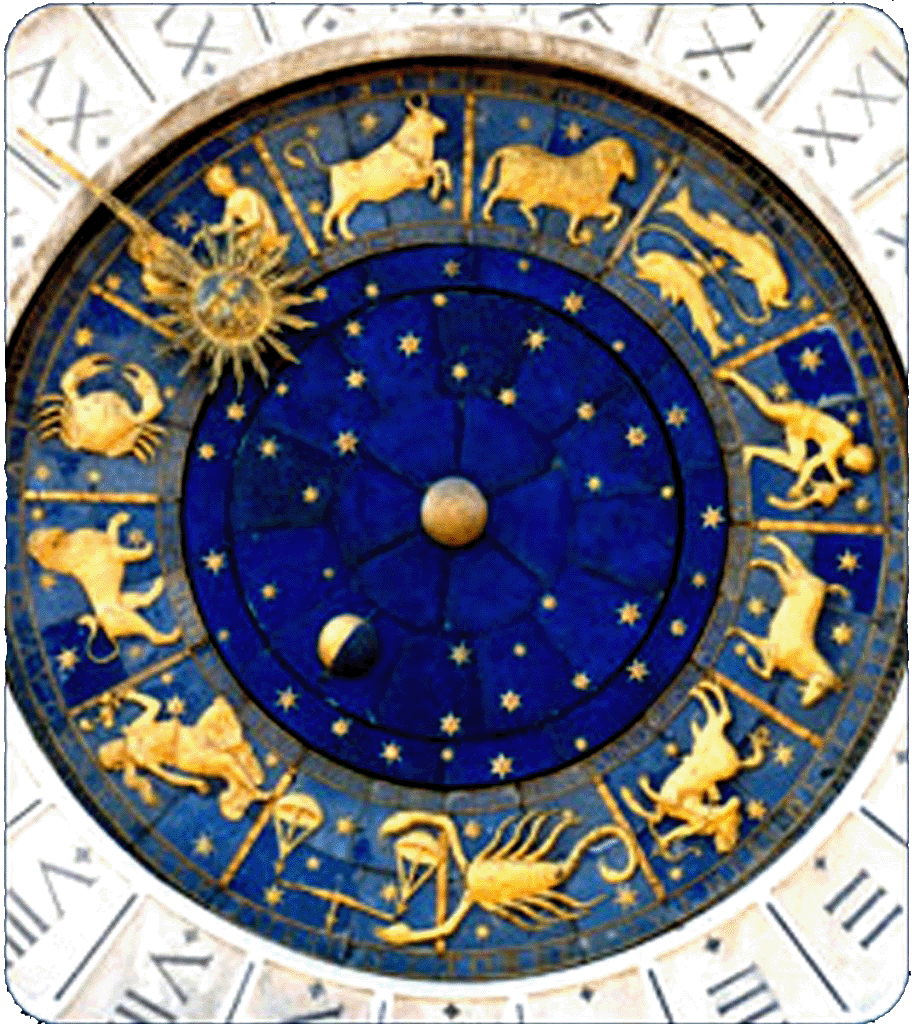.
The twelve houses
The following description refers to different judgments by different authors contained in some of the writings that go under the name “Hermes” and they also are part of the hermetic astrology, mentioned by Iamblichus [1] (fourth century) in the Egyptian Mysteries, that we read in Greek literature in authors like Paul of Alexandria [2] (schematic description of the twelve places Paul of Alexandria – Introduction to the judgments, Ed. AE. Boer, Pauli Alexandrini Elementa apotelesmatica, Leipzig 1958, ch. 24) or Rhetorius [3] (Hermes Trismegistus on the names and the strength of the twelve places Rhetorius – Rhetorii Aegypti capitula selecta, pp. 126-174) which describe the “places according to Hermes” [4] .
.
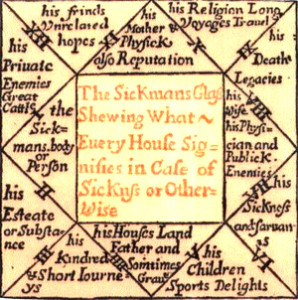 The Ascendant and the first house
The Ascendant and the first house
It is the first in order of importance because from the first house we can understand everything concerning the life of the human being. The horoscope is the origin of life and of the spirit, for this reason it is called the “rudder” and it shows both benefits and evils for the person who is born. The star of Mercury in this place cheers up (it is in its joy) [5] since it is pneumatic, by virtue of the logos, and it shows the foundation and the breath of life. It indicates the first age and childhood in the stages of life.
When a beneficial star or a luminary (the Sun or the Moon) or the star of Mercury, without any evidence of malefic stars rises with the horoscope, the person who is born is vital, healthy, feeds enough (during lactation) and will lead his life in 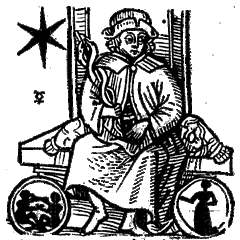 prosperity. If an evil star rises with the ascendant and it is observing the Sun or the Moon, who is born is not breastfed enough or may have a short life, or can be subject to various diseases or may present physical defects or even can be an orphan. If the Sun rises with the horoscope, in its own triangle, or Saturn, the natives are the first to be generated or the first to be fed. Saturn rising with the ascendant, in diurnal birth, gives birth to the baby with loud cries. Saturn rising in a night birth brings harm, trouble, pains, activities in damp places. When the Moon rises in its faction [6] and is not afflicted by evil spells, it gives birth to people who have authority and commands, the tycoons, the kings. If the Moon receives procession [7] from stars of the same faction [8] , it gives birth to those who look and perform functions in temples or high priests. If Venus rises with the ascendant, it gives
prosperity. If an evil star rises with the ascendant and it is observing the Sun or the Moon, who is born is not breastfed enough or may have a short life, or can be subject to various diseases or may present physical defects or even can be an orphan. If the Sun rises with the horoscope, in its own triangle, or Saturn, the natives are the first to be generated or the first to be fed. Saturn rising with the ascendant, in diurnal birth, gives birth to the baby with loud cries. Saturn rising in a night birth brings harm, trouble, pains, activities in damp places. When the Moon rises in its faction [6] and is not afflicted by evil spells, it gives birth to people who have authority and commands, the tycoons, the kings. If the Moon receives procession [7] from stars of the same faction [8] , it gives birth to those who look and perform functions in temples or high priests. If Venus rises with the ascendant, it gives 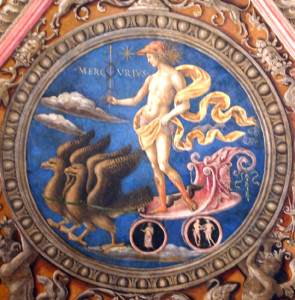 birth to attractive and nice people, music lovers, those who have promiscuous relationships and who are not happy in marriage. If Mercury rises with ascendant, it gives birth to discerning, wise, rational people. If Mars rises with the horoscope, it produces a rapid childbirth that takes place on the road or in the water. If Mars is opposed to their faction, it gives birth to passionate, bold, brave people, those who make risky actions, those who expatriate, who are unstable in their opinions and sometimes it causes physical injury or disease of the soul. Mars rising in its own faction gives birth to generals, soldiers, military commanders, lords of life and death, feared in the cities and regions, but also the artisans who work fire and iron. If Jupiter rises with the ascendant, without evidence of the evil stars and in their own faction, gives birth to leaders, those who have a command or are appointed to public office, those who live happily and have a virtuous mind. If there is the lot of Fortune [9] and its lord, and it is matutine and not plagued by evil, it gives birth to those who are born happy and with a long life.
birth to attractive and nice people, music lovers, those who have promiscuous relationships and who are not happy in marriage. If Mercury rises with ascendant, it gives birth to discerning, wise, rational people. If Mars rises with the horoscope, it produces a rapid childbirth that takes place on the road or in the water. If Mars is opposed to their faction, it gives birth to passionate, bold, brave people, those who make risky actions, those who expatriate, who are unstable in their opinions and sometimes it causes physical injury or disease of the soul. Mars rising in its own faction gives birth to generals, soldiers, military commanders, lords of life and death, feared in the cities and regions, but also the artisans who work fire and iron. If Jupiter rises with the ascendant, without evidence of the evil stars and in their own faction, gives birth to leaders, those who have a command or are appointed to public office, those who live happily and have a virtuous mind. If there is the lot of Fortune [9] and its lord, and it is matutine and not plagued by evil, it gives birth to those who are born happy and with a long life.
.
The Second House
It is the house that expresses the condition of life and is called the “Gates of Hades” and the place dispensing good hopes. It indicates what concerns activities as it is evidence of the upper culmination for left trine. The presence of benefic stars in the Second House expresses the benefits occurring with the passing of time. In these cases it indicates people inheriting good of 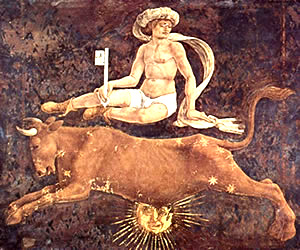 others. The presence of malefic stars in this place for the person denotes a decay of living conditions, the loss of substances and it indicates, in general, the achievement of goods and substances with difficulty and, in some cases, the need to migrate away from the own land of origin.
others. The presence of malefic stars in this place for the person denotes a decay of living conditions, the loss of substances and it indicates, in general, the achievement of goods and substances with difficulty and, in some cases, the need to migrate away from the own land of origin.
The Sun in the second house gives birth to those who themselves create their own wealth and live happily. If the Moon is in the second house and Saturn is the Ascendant who is born will have vision problems and will be exposed to various vicissitudes and fluctuations in life means. Saturn in the second house, at night birth, provokes the loss of children, many upheavals, constant illnesses and loss of paternal and maternal goods. In case of diurnal birth it indicates those who increase gradually their life resources. Jupiter in the Second house shows those who inherit property of others, and sometimes,
those who are adopted. Jupiter, both in diurnal and in nocturnal birth, gives property and possessions. Mars, in diurnal birth, causes the alienation of relatives and friends, the possible expatriation, deprivation and hardship. If Jupiter and Venus testify the 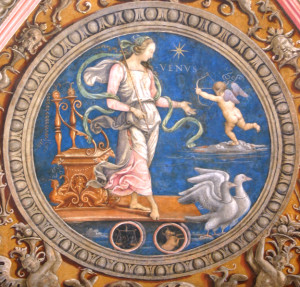 native escapes to various dangers, however, he does not always have the necessary means for his existence. Mars, in nocturnal birth indicates the soldiers, athletes and those who are uncertain and changeable in their actions and opinions. Venus in the second house, in diurnal birth arouses opposition, lawsuits and it delays the wedding. In the night, Venus indicates kind and pleasant people and who has a lot of resources and become very prosperous with the passing of time. Mercury in the Second house, in the evening hours, makes the usurers, merchants, the administrators of other people’s business, the wise administrators. Mercury in the day makes the philosophers and men of simple character, of a special nature. If Mercury, in this place, is contrary to its own faction, it makes fool, devious and false, illiterate natives and without means of life.
native escapes to various dangers, however, he does not always have the necessary means for his existence. Mars, in nocturnal birth indicates the soldiers, athletes and those who are uncertain and changeable in their actions and opinions. Venus in the second house, in diurnal birth arouses opposition, lawsuits and it delays the wedding. In the night, Venus indicates kind and pleasant people and who has a lot of resources and become very prosperous with the passing of time. Mercury in the Second house, in the evening hours, makes the usurers, merchants, the administrators of other people’s business, the wise administrators. Mercury in the day makes the philosophers and men of simple character, of a special nature. If Mercury, in this place, is contrary to its own faction, it makes fool, devious and false, illiterate natives and without means of life.
The Third House
It is called “propitious declivity” and takes the name of the place of the Moon, called the Goddess, a shady imperious, place, 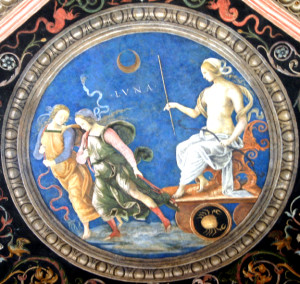 interval between the two worlds [10]. This is the place where substances are acquired and it expresses everything regarding the brothers. It deals with friends and patronage, and can tell us something on the expatriation as it is located opposite to the ninth place that teaches on the expatriation. And this is the house where the Moon is glad (it is in its joy). The presence of beneficial planets in the third house, placed in their faction, improve living conditions and promote the acquisition of goods and substances. They are also favourable as regards the brothers and friends. They lead favours and gifts to brothers and friends and they represent those who have many friends and brothers. The presence of malefic stars in the third house expresses contrary conditions to those just mentioned.
interval between the two worlds [10]. This is the place where substances are acquired and it expresses everything regarding the brothers. It deals with friends and patronage, and can tell us something on the expatriation as it is located opposite to the ninth place that teaches on the expatriation. And this is the house where the Moon is glad (it is in its joy). The presence of beneficial planets in the third house, placed in their faction, improve living conditions and promote the acquisition of goods and substances. They are also favourable as regards the brothers and friends. They lead favours and gifts to brothers and friends and they represent those who have many friends and brothers. The presence of malefic stars in the third house expresses contrary conditions to those just mentioned.
If the Moon is in the third place and it dominates the Ascendant and the lot of Fortune, especially in its own face [11], waxing in light and motion, who is born is powerful and rich, and has revelations from gods and authorities. If the Sun or the horoscope Lord is present with the Moon in the Third place it makes those who expatriate. Saturn and Mercury in the third place make the mystics, those who give revelations in dreams. If Saturn and Mercury are looking at the third place they make men of letters, the 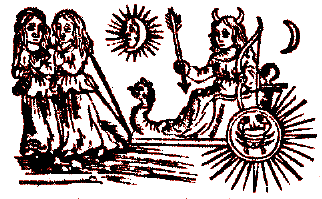 rhetoris and wise men. If Saturn and Mars are looking at the third place, they generate the wandering and bad friendships. Venus in the third house grants gifts and favours from women. Jupiter and Saturn in the third place, deprived of the testimony of Mars, mean prosperity. If Jupiter, in this place, has joined the Moon, the newborn child will be a magician or a prophet, and he will be rich. If Mercury is joined to the Moon, in their own faces, and dominates the Ascendant or the lot of Fortune, the newborn child will predict the future, will receive responses from dreams, will participate to the secret mysteries and he will be an expert on many things. If the Lord of the third place is a sign of abundant seed and is kept by the benefits, it indicates many brothers.
rhetoris and wise men. If Saturn and Mars are looking at the third place, they generate the wandering and bad friendships. Venus in the third house grants gifts and favours from women. Jupiter and Saturn in the third place, deprived of the testimony of Mars, mean prosperity. If Jupiter, in this place, has joined the Moon, the newborn child will be a magician or a prophet, and he will be rich. If Mercury is joined to the Moon, in their own faces, and dominates the Ascendant or the lot of Fortune, the newborn child will predict the future, will receive responses from dreams, will participate to the secret mysteries and he will be an expert on many things. If the Lord of the third place is a sign of abundant seed and is kept by the benefits, it indicates many brothers.
The Fourth house
The fourth house is called underground or lower culmination and occupies the corner of the north. It provides guidance on the old age and the end of life, about the hidden things, on the house in which you were born, on the foundation, on the burial of the body and about what comes after death. In addition, it provides guidance on parents, human relationships, the country of origin, duration, and on all movable goods, on landed properties and on immovable properties. In some cases it may indicate the acquisition 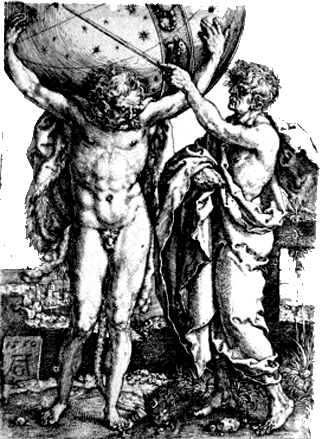 of ships or humid places.
of ships or humid places.
If in the fourth place there is Saturn, in its own faction, this indicates rich people which gain assets and property during mature age; it can also give unexpected gains. If Saturn is contrary to its own faction it only brings damage. In particular, at night, it diminishes the paternal heritage so that the person should live abroad or it indicates that the newborn child is an orphan or shows a youth with diseases. In addition, it can limit the chances of success and create risks of infamy or disgrace. If in the fourth house there is Mars, in diurnal birth, the newborn children are sickly and epileptic and generally it arouses adversity; in nocturnal birth ills are less and, if there is evidence of a beneficial star, it directs the native to military life. In any case it creates problems with the marriage and children. Jupiter and Venus in the fourth place give a happy old age and a good death. In this place, Venus indicates a bad marriage but an old age without worries. In nocturnal birth, Venus creates those who, with the passing of time, become prosperous, friends of great people, those who are appreciated for their manners, graceful and elegant since their youth, provided with any means, nevertheless subject to passions. Jupiter in the Fourth house gives benefits from arcane things or from inheritance or from the discovery of treasures. Jupiter, in line with its own faction, makes great leaders, experts ruling matters of state, religious people, those who trust in gods, and who are guided by them, which predict future events. If Jupiter is contrary to its own faction it produces mediocre things but adds to the native prosperity and esteem with the passing of time. The Moon, seen from Saturn and Mars, creates troubles in hidden places or because of secrets. In this house the Moon, observed by beneficial planets, brings advantages and utilities from hidden bargains. In the fourth house the Moon in line with its own faction indicates that the mother is illustrious and enhances the condition of life of the newborn. If the Moon is contrary to its own faction the mother is obscure but who is born is rich of resources, dedicated to business. If the Sun is in the Fourth house, if it is afflicted by malefic stars, it hurts the living condition of those who are born and his parents. Mercury in the fourth place, in morning position [12], shows who participates in arcane initiations. If Mercury is observed by malefic planets it involves the native in charges or sentences or incarcerations. Mercury in vespertine position [13] in the Fourth place makes the goldsmiths, inventors, the initiates to the mysteries, mathematicians, people responsible for gyms.
The Fifth House
The fifth place is the place of Venus and is known as “good luck” and progress since here Venus rejoices (it is in its joy). The fifth 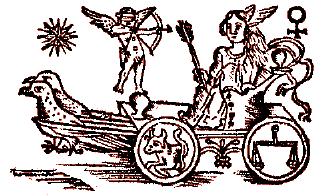 house follows the underground foundation and teaches on the issue of children. The beneficial stars in the Fifth place give a happy offspring. On the contrary, the evil stars in this place are harmful for issues concerning children: as for living conditions, health and life.
house follows the underground foundation and teaches on the issue of children. The beneficial stars in the Fifth place give a happy offspring. On the contrary, the evil stars in this place are harmful for issues concerning children: as for living conditions, health and life.
The Sun in this place makes those who are moderately happy, who have no children or are unhappy about their children. The Moon in the Fifth house, in nocturnal birth, without evidence of evil stars, shows people full of grace and favours, which have advantages and goods by their parents, authoritative, prosperous and illustrious figures. The Moon, during the day, means the wandering, the alienation of parents or the orphan condition but, over time, it brings prosperity. Saturn in the fifth place, in diurnal birth, means those who acquire substances with the passing of time and it brings authorities. Saturn, in the night, makes youth uncertain and inconstant and reduces substances; moreover it indicates delays in the undertaken actions, the laziness of the native and represents those who lose what they have purchased. Jupiter in the Fifth place, both during day and night, indicates those who have influence or leadership for fortunate circumstances. Mars in the fifth house, in nocturnal birth, grants substances and many benefits, honours of the people and the proximity to the powerful people. If Mars is dignified and joined to the Moon, it makes big chiefs, the powerful and fearsome leaders. Mars in this place in diurnal birth makes those who are prone to damage and dangers. Venus in the fifth place makes the talented and successful fighters, those who have authority and luck in everything, those who buy with time, prophesy the future, who are close to great people, who progress thanks to their love affairs. Mercury in the Fifth place, in morning position, makes those who have a long life and a happy offspring, who accumulate goods and the owners of substances of others. If Mercury is vespertine, it makes dissipate what the native has preserved. As for professions, it makes the interpreters of the law, teachers, surveyors, mathematicians, people responsible for gyms.
The Sixth House
It is the place indicating what is already set. It is called “bad declivity” and “bad luck” and “pain” or interval between the two worlds [14]. It provides information about the disease and the aptitude to serve: in general what has the meaning of service, deed and 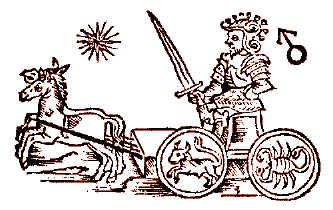 work for others. This is the house where the planet Mars is successful and here it rejoices (it is in its joy). Mars in the Sixth place, in nocturnal birth, female sign, in trine to the luminaries or beneficial stars, pushes to the military life or a martial glory. All the other stars in the sixth place are weak and largely ineffective if some stars lack in the tenth house and the upper culmination or in the twelfth place. The star representing the action in the sixth place is effective and operative because, in its clockwise motion, over time it realizes the figure on the upper culmination. A star misplaced in this place can cause hostilities caused by women, pitfalls and rebellions.
work for others. This is the house where the planet Mars is successful and here it rejoices (it is in its joy). Mars in the Sixth place, in nocturnal birth, female sign, in trine to the luminaries or beneficial stars, pushes to the military life or a martial glory. All the other stars in the sixth place are weak and largely ineffective if some stars lack in the tenth house and the upper culmination or in the twelfth place. The star representing the action in the sixth place is effective and operative because, in its clockwise motion, over time it realizes the figure on the upper culmination. A star misplaced in this place can cause hostilities caused by women, pitfalls and rebellions.
The Sun in the sixth place gives a poor and obscure or cowardly father whose condition declines or, in some cases, the lack of the father and makes the native in a state of subordination and subject to superiors. If the Sun is in sixth place and there is a star in the Tenth House this indicates a prosperous state thanks to the parents. The Moon in this place makes people with a poor or indigent 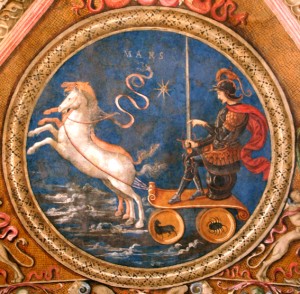 mother or servant or, in some cases, the motherless. The Sun, the Moon or Mars in the sixth place and bad placed damage the sight and the organ of the spleen. Saturn in Sixth place, in nocturnal birth, deprives the paternal heritage and gives dangers and pitfalls by servants; for certain it can cause illness. Saturn in diurnal birth brings minor injury. Jupiter in sixth place, especially in the night, brings disputes and quarrels with superiors. If Jupiter is the lord of the sixth place and it is observed by malefic stars and it is bad placed in the sixth or twelfth place, it creates those suffering from liver (and who have damage from wine). Mars in sixth place, especially in diurnal birth, produces illness or disease and dangers, servants pitfalls, convictions or imprisonment. Venus in the Sixth place, both during day and night, generates unions with women of humble condition or widowed or sick women, it denies the benevolence of women unless there is a star in the tenth house. If the star in tenth house conforms to their faction the native has grace, favours, he is made prosperous by women and he is successful. Mercury in the Sixth place, in diurnal birth, brings gains and fortune because of writings, for the eloquence or business or for divine cause, especially if there is a star in the tenth place. Mercury in this place, in nocturnal birth, in morning position, makes the bird catchers, the fishermen, the engravers, the interpreters; if there is no star in the tenth place it makes lazy people, the deceivers, people with bad intentions. If Mercury, in the night, is vespertine, it makes sensible, judicious people, the skilful people in the judgment, in charge of calculations, procurement, banking business or of letters or trade and thanks to these activities they become prosperous.
mother or servant or, in some cases, the motherless. The Sun, the Moon or Mars in the sixth place and bad placed damage the sight and the organ of the spleen. Saturn in Sixth place, in nocturnal birth, deprives the paternal heritage and gives dangers and pitfalls by servants; for certain it can cause illness. Saturn in diurnal birth brings minor injury. Jupiter in sixth place, especially in the night, brings disputes and quarrels with superiors. If Jupiter is the lord of the sixth place and it is observed by malefic stars and it is bad placed in the sixth or twelfth place, it creates those suffering from liver (and who have damage from wine). Mars in sixth place, especially in diurnal birth, produces illness or disease and dangers, servants pitfalls, convictions or imprisonment. Venus in the Sixth place, both during day and night, generates unions with women of humble condition or widowed or sick women, it denies the benevolence of women unless there is a star in the tenth house. If the star in tenth house conforms to their faction the native has grace, favours, he is made prosperous by women and he is successful. Mercury in the Sixth place, in diurnal birth, brings gains and fortune because of writings, for the eloquence or business or for divine cause, especially if there is a star in the tenth place. Mercury in this place, in nocturnal birth, in morning position, makes the bird catchers, the fishermen, the engravers, the interpreters; if there is no star in the tenth place it makes lazy people, the deceivers, people with bad intentions. If Mercury, in the night, is vespertine, it makes sensible, judicious people, the skilful people in the judgment, in charge of calculations, procurement, banking business or of letters or trade and thanks to these activities they become prosperous.
The Seventh House
The seventh place is the angle of the sunset, it is called “anti horoscope”, it indicates the old age and gives information on weddings, long-term expatriations, quality of death, sometimes about inheritance and disease, in particular regarding fingers, feet 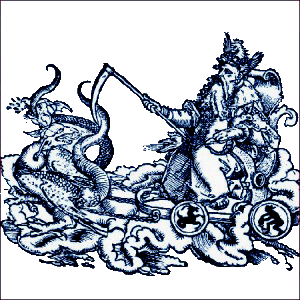 and bladder. This is the house indicating the late outcomes and granting promotions with the passing of time. It brings good weddings though with few children and it also shows those who suffer because of his wife and children.
and bladder. This is the house indicating the late outcomes and granting promotions with the passing of time. It brings good weddings though with few children and it also shows those who suffer because of his wife and children.
If there is Saturn in the seventh house, in diurnal birth, it will rejoice if it is in its own signs or trines or exaltations. In this case it indicates the long-lived and rich people, and who meet their objectives belatedly. In addition, especially if it is in its non-signs, this involves various diseases, “suffering in the hidden parts, deseases in the back parts of the body, sometimes blood flow arrest (thrombosis), dysenteries and stomach flows”. The star of Mars in seventh place helps to produce many evils, infirmities and diseases. Generally it makes those who buy with difficulty and they spend their lives in a foreign country. Furthermore, it makes the emigrants or exiles and sometimes, when it takes the shape of the luminaries or receives the influence of the Moon, with no evidence of beneficial stars, it indicates who has a short life or a violent death. Jupiter in the Seventh place makes those who, with the passing of time, increase their resources easily. 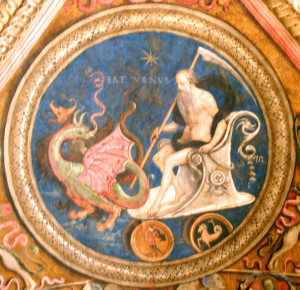 Jupiter, on the day, makes long-lived people, with few children and those who become rich in the latter part of life. Jupiter, in the night, brings fewer advantages and indicates prosperity around middle age. The star of Venus at the angle of Sunset makes who is subjec to slander, those who marry later, who love to innovate, which remain youthful even with the passing of time; it gives a good old age and a gentle death. Mercury indicates the sensible people and anyone who knows letters and sciences even when exposed to the diseases of the soul. The Sun in the seventh house, in male sign, in diurnal birth and free of afflictions of malefic planets, gives a good life and wealth and makes those born from distinguished fathers. The Moon in this Seventh place causes expatriation abroad, characterizes people who wander a lot and that are subject to a fluctuating fate. If the Moon is in moist signs and nativity is diurnal, it makes the shipowners, sailors, those who live on trade. The Moon in the night arouses the place changes or expatriations and makes those who increase their standard of living with the passing of time.
Jupiter, on the day, makes long-lived people, with few children and those who become rich in the latter part of life. Jupiter, in the night, brings fewer advantages and indicates prosperity around middle age. The star of Venus at the angle of Sunset makes who is subjec to slander, those who marry later, who love to innovate, which remain youthful even with the passing of time; it gives a good old age and a gentle death. Mercury indicates the sensible people and anyone who knows letters and sciences even when exposed to the diseases of the soul. The Sun in the seventh house, in male sign, in diurnal birth and free of afflictions of malefic planets, gives a good life and wealth and makes those born from distinguished fathers. The Moon in this Seventh place causes expatriation abroad, characterizes people who wander a lot and that are subject to a fluctuating fate. If the Moon is in moist signs and nativity is diurnal, it makes the shipowners, sailors, those who live on trade. The Moon in the night arouses the place changes or expatriations and makes those who increase their standard of living with the passing of time.
,
The Eighth House
The Eighth house is the place that declines after sunset and teaches on the outcome of death. It is said inactive and idle because it is separated and detached from the Ascendant representing life. It is not a place that gives good results but the presence of beneficial stars in this House is beneficial from the deaths as it brings inheritance and, however, it makes people who benefit from the deaths.
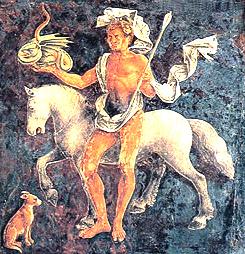 This kind of benefit is also given by malefic stars and the Moon, when it increases its motion towards the boreal part of the ecliptic, and it has a growing light. On the contrary, the waning moon phase, with no evidence of the beneficial planets, makes those who buy with difficulties, those who are subject to passions, the destitutes, the poor people. If the malefic stars are in the eighth place, and they are contrary to their own faction or are afflicted, they involve a deterioration of the living conditions, the decay of activities, large losses and adversities, and sometimes they are one of the causes of a bad death. When Mars in the eighth place, if the Sun and the Moon rise on the Ascendant, it damages the sight; in diurnal birth it creates confusion, danger and indigence. Saturn in the eighth place in the day, makes those who improve their substances with the passing of time, those who derive profits from death, those which provide for others. Saturn, in the night, makes who is subject to decline, it causes diseases and a bad death. When Jupiter is in the eighth place, in Eastern position [15] and its dignity, if there is no evidence of malefic stars, it brings advantages from matters related to deaths. The Sun in the Eighth House shows the decay of his father’s condition or his illness or disease. Sometimes it is a sign of premature death of the father and makes unproductive any other matter. The star of Venus makes no fruitful married life and, sometimes it shows people subject to passions and immodest people. The star of Mercury makes people taciturn, closed in themselves and who love the quiet. If Mercury is observed by a malefic star, it can generate thieves or forgers. If Mercury is under the rays and separates from Saturn, by conjunction, in square or opposite aspect, it makes foolish, imprudent and idle people.
This kind of benefit is also given by malefic stars and the Moon, when it increases its motion towards the boreal part of the ecliptic, and it has a growing light. On the contrary, the waning moon phase, with no evidence of the beneficial planets, makes those who buy with difficulties, those who are subject to passions, the destitutes, the poor people. If the malefic stars are in the eighth place, and they are contrary to their own faction or are afflicted, they involve a deterioration of the living conditions, the decay of activities, large losses and adversities, and sometimes they are one of the causes of a bad death. When Mars in the eighth place, if the Sun and the Moon rise on the Ascendant, it damages the sight; in diurnal birth it creates confusion, danger and indigence. Saturn in the eighth place in the day, makes those who improve their substances with the passing of time, those who derive profits from death, those which provide for others. Saturn, in the night, makes who is subject to decline, it causes diseases and a bad death. When Jupiter is in the eighth place, in Eastern position [15] and its dignity, if there is no evidence of malefic stars, it brings advantages from matters related to deaths. The Sun in the Eighth House shows the decay of his father’s condition or his illness or disease. Sometimes it is a sign of premature death of the father and makes unproductive any other matter. The star of Venus makes no fruitful married life and, sometimes it shows people subject to passions and immodest people. The star of Mercury makes people taciturn, closed in themselves and who love the quiet. If Mercury is observed by a malefic star, it can generate thieves or forgers. If Mercury is under the rays and separates from Saturn, by conjunction, in square or opposite aspect, it makes foolish, imprudent and idle people.
The Ninth House
The ninth house comes before the upper culmination and represents the dreams, what concerns the gods and the expatriation. It is 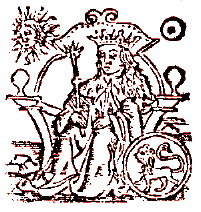 called “deus”, the place of the Sun, because in the ninth place the Sun is glad (it is in its joy), and “propitious declivity.” It is defined as astronomical sign and metakosmion, or interval between the two worlds [16] .
called “deus”, the place of the Sun, because in the ninth place the Sun is glad (it is in its joy), and “propitious declivity.” It is defined as astronomical sign and metakosmion, or interval between the two worlds [16] .
The presence of beneficial stars, in their dignity and not observed by evil, indicates prosperity in a foreign land, and that the native is a pious man and observant of divine worship. If in this place the Sun or Saturn or Jupiter or Mercury have dignity or dominion, they grant favours or gifts or benefits from the gods and kings. They make philosophers and mystics, people who have rich natural gifts and sometimes they are put in charge of the temples and religious worship. They also represent the people that expatriate. If the Moon is placed in the ninth place and is associated to an evil star or Mercury, it indicates expatriation. The Moon, in the night, means stays in a foreign land which bring honour and fame. The Moon, in the day, means trivial stays abroad and a life spent in wanderings and the presence of danger. The Sun in the
ninth place makes the temple builders, the engravers of sacred images or those that found sanctuaries, and that stand for these 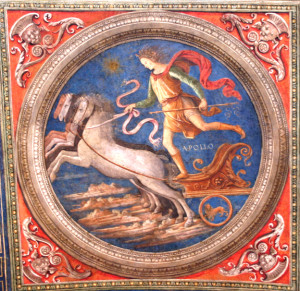 things, or have appointments in temples or favours or superintendence. The Sun with matutine Mercury makes the interpreters of dreams, wishes, the inspired people, the astrologers and those who participate in the mysteries, who earn a living from these activities. Mercury in the Ninth place, in vespertine aspect, makes the priests, magicians, doctors practising without the need to learn. Venus in the Ninth place, in line with its own faction, makes rich people, suitable for business, the priests, the God-fearing people. If Jupiter is joined to Venus or observes it, the newborn child has grace and favours, easily follows what is proposed, receives benefits and advantages from women, and sometimes, he runs his wife’s assets. Jupiter in the Ninth place, in diurnal birth, makes those who provide responses by visions of the gods, sometimes, those who achieve priestly duties. Jupiter, in the night, makes those who dream uncertain things or who tell lies on the visions of the gods. Saturn in the ninth house, in diurnal birth, makes the mystics, the Arch magicians [17] , the philosophers, those who predict the future and some of them carry out their work in temples or preside at worship. Saturn, in the night, indicates the prophets, interpreters of dreams, those who dwell locked up in temples, the philosophers. Mars in the ninth place, during the day and night, makes the sophists, those who are not God-fearing, who swear in vain and strike fear to the spirits.
things, or have appointments in temples or favours or superintendence. The Sun with matutine Mercury makes the interpreters of dreams, wishes, the inspired people, the astrologers and those who participate in the mysteries, who earn a living from these activities. Mercury in the Ninth place, in vespertine aspect, makes the priests, magicians, doctors practising without the need to learn. Venus in the Ninth place, in line with its own faction, makes rich people, suitable for business, the priests, the God-fearing people. If Jupiter is joined to Venus or observes it, the newborn child has grace and favours, easily follows what is proposed, receives benefits and advantages from women, and sometimes, he runs his wife’s assets. Jupiter in the Ninth place, in diurnal birth, makes those who provide responses by visions of the gods, sometimes, those who achieve priestly duties. Jupiter, in the night, makes those who dream uncertain things or who tell lies on the visions of the gods. Saturn in the ninth house, in diurnal birth, makes the mystics, the Arch magicians [17] , the philosophers, those who predict the future and some of them carry out their work in temples or preside at worship. Saturn, in the night, indicates the prophets, interpreters of dreams, those who dwell locked up in temples, the philosophers. Mars in the ninth place, during the day and night, makes the sophists, those who are not God-fearing, who swear in vain and strike fear to the spirits.
.
The Tenth House
The tenth place is the southern angle showing its meanings from the average age and it is called place in the middle of the top. It provides guidance on the actions and activities, about relationships, about dignity, esteem, credit, on the country, on the basis of 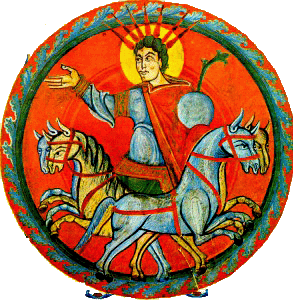 the parents and also on youth and on what concerns the marriage and children.
the parents and also on youth and on what concerns the marriage and children.
The Sun in the tenth house, devoid of evil star rays, creates the children of an illustrious father and makes illustrious, renowned people capable to command. In nocturnal birth, the Moon in the tenth house, if it is not observed by evil stars, by union, in square or opposite aspect, makes clear, distinct and rich people, the public treasury officials and administrators, who have a mother of noble lineage. If the Moon responds to its own faction, and it is in the culminant sign of the Zodiac, it indicates extraordinary people in their actions, in purposes to which they give a hand and in what they do. If the Moon goes toward Saturn or Saturn occupies an angle of the Nativity, tribulations, hardships, toils arise frequently. The star of Saturn in the tenth house, in diurnal birth, in convenient signs, indicates the property owners, the countryside lovers, the landowners, the occupations in wet activities. In nocturnal birth it brings misfortune or bad outcomes, the inactivity, difficulty in marriage, few children, sometimes destitution or living abroad for a long time or having to wander a long time. As for professions it indicates occupations in damp places and it makes gardeners, plumbers, sailors, fishermen, boatmen. The star of Jupiter, in the day, in the culminating sign, makes the athletes, those who have authority in public affairs, those who are esteemed by people, who maintain dignity titles for life. Jupiter, in diurnal and eastern birth, devoid of Mars rays, gives a noble condition and makes the people 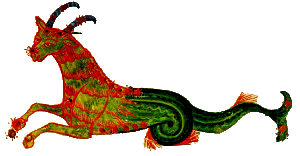 who have a glorious life, it makes distinguished, well-known men or those to which the rulers and business tycoons are entrusted. In addition, men are resourceful and friends of great and distinguished people and known to all. Jupiter in nocturnal birth indicates the illustrious people but not equally appraised, which are happy and prosperous, and whose fortunes do not last forever. Mars joined to the Midheaven, in diurnal birth, separates parents, disperses the family substances, brings hardship and adversity to the native from his youth and gives a few sons. If Mars does not receive evidence from the beneficial planets, it may indicate the violent death of those who are born. If Jupiter and Venus are in conjunction, they will have a good old age and will avoid danger. The star of Venus culminating in its vespertine rising [18] and devoid of evil rays of the stars, makes the high priests, those who are successful, the counselors, the ranking prelates. It
who have a glorious life, it makes distinguished, well-known men or those to which the rulers and business tycoons are entrusted. In addition, men are resourceful and friends of great and distinguished people and known to all. Jupiter in nocturnal birth indicates the illustrious people but not equally appraised, which are happy and prosperous, and whose fortunes do not last forever. Mars joined to the Midheaven, in diurnal birth, separates parents, disperses the family substances, brings hardship and adversity to the native from his youth and gives a few sons. If Mars does not receive evidence from the beneficial planets, it may indicate the violent death of those who are born. If Jupiter and Venus are in conjunction, they will have a good old age and will avoid danger. The star of Venus culminating in its vespertine rising [18] and devoid of evil rays of the stars, makes the high priests, those who are successful, the counselors, the ranking prelates. It 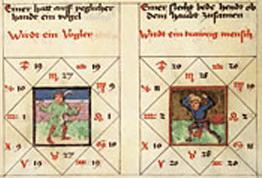 brings a happy marriage and a good offspring. It indicates the situation of being appreciated, famous and celebrated by the people. When Venus is at its matutine rising [19], it makes those who live with few resources and indicates those who have an inclination for the arts, and for those who are pleasant, witty, musicians and singers. Mercury culminating, makes those keen on science and letters. These are inspectors, secretaries, auditors, notaries, lawyers, prosecutors, jurists, interpreters or bankers. If Mercury is in a culminating sign, it is matutine, and with the evidence of a star of its own faction, it makes the native loyal, virtuous, with great power of discernment and who carry out actions of great force, surprising and wonderful. They are people who have great power and who are entrusted public office by the citizens or by the rulers. If Mars is configured to Mercury, by union, in square or opposite aspect, in their advancing they will fall into obstacles and incur exile and it makes liars, wicked people, the atheists, thieves, and also the magicians or their accomplices, counterfeiters, murderers and their ilk, but also the executioners, jailors, customs officers. If Mercury culminates vespertine it makes those who practise a public profession and it produces several stays in foreign lands and place changes.
brings a happy marriage and a good offspring. It indicates the situation of being appreciated, famous and celebrated by the people. When Venus is at its matutine rising [19], it makes those who live with few resources and indicates those who have an inclination for the arts, and for those who are pleasant, witty, musicians and singers. Mercury culminating, makes those keen on science and letters. These are inspectors, secretaries, auditors, notaries, lawyers, prosecutors, jurists, interpreters or bankers. If Mercury is in a culminating sign, it is matutine, and with the evidence of a star of its own faction, it makes the native loyal, virtuous, with great power of discernment and who carry out actions of great force, surprising and wonderful. They are people who have great power and who are entrusted public office by the citizens or by the rulers. If Mars is configured to Mercury, by union, in square or opposite aspect, in their advancing they will fall into obstacles and incur exile and it makes liars, wicked people, the atheists, thieves, and also the magicians or their accomplices, counterfeiters, murderers and their ilk, but also the executioners, jailors, customs officers. If Mercury culminates vespertine it makes those who practise a public profession and it produces several stays in foreign lands and place changes.
.
The Eleventh House
The eleventh house is called “good genius” and it is the place where Jupiter is glad (it is in its joy). This place shows the supports 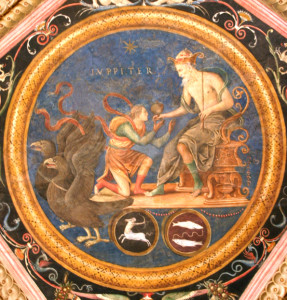 and protections, and it also means the high hopes, the elderly. It teaches the children, on the activities and the patronage and it expresses its positive influence and protection at the youthful age climax. In general, the beneficial stars in the eleventh place, in their dignity, indicate great wealth and important actions. Similarly, the evil stars in the eleventh place, who have a right on the natal chart and that are not flue, retrograde, in exile or falling, they bring prosperity and goods and diminish the evils for those who are born.
and protections, and it also means the high hopes, the elderly. It teaches the children, on the activities and the patronage and it expresses its positive influence and protection at the youthful age climax. In general, the beneficial stars in the eleventh place, in their dignity, indicate great wealth and important actions. Similarly, the evil stars in the eleventh place, who have a right on the natal chart and that are not flue, retrograde, in exile or falling, they bring prosperity and goods and diminish the evils for those who are born.
The Sun in this place indicates that the native’s father is rich and illustrious and, with the passing of time, he himself will become prosperous and he will buy easily. The Moon in the eleventh place, mainly in nocturnal birth and if it joins to a benefic star, it makes the rich and wealthy mother and brings to those born rich resources, nobility and dignity. The Moon, in nocturnal birth, with no evidence of evil stars, makes eminent people, who are full of grace and favours, they receive benefits, and goods from their parents. The Moon in diurnal birth, indicates the parents’ separation, the wandering of the native and grants 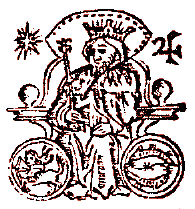 prosperity with the passing of time. The star of Saturn, if it is in its own hairesis [20], refers to those who, with the passing of time, obtain durable real estate and, nevertheless, they are indolent in the activities and intentions. Saturn, in nocturnal birth, diminishes what the person has, and it indicates inactive people who do not achieve their purposes. If the Sun rises in the natal chart, and if Saturn is in the eleventh place in diurnal birth, it gives power and regal dignity. If the crescent Moon goes towards Saturn, it gives the greatest authorities with benefit and advantage. Jupiter in the eleventh place, both during day and night, brings the improvement of living conditions and it brings reputation and assets acquisition. The natives are distinguished and prevail over their enemies and are protected and, for their strong physique, they are preserved from much of the sickness and disease. The star of Mars in the eleventh place, in diurnal birth chart, undermines the living conditions, the activities are lost, the places change, there are false moves and falls, there is unhappiness about the children. Mars, in nocturnal birth, brings several advantages and makes
prosperity with the passing of time. The star of Saturn, if it is in its own hairesis [20], refers to those who, with the passing of time, obtain durable real estate and, nevertheless, they are indolent in the activities and intentions. Saturn, in nocturnal birth, diminishes what the person has, and it indicates inactive people who do not achieve their purposes. If the Sun rises in the natal chart, and if Saturn is in the eleventh place in diurnal birth, it gives power and regal dignity. If the crescent Moon goes towards Saturn, it gives the greatest authorities with benefit and advantage. Jupiter in the eleventh place, both during day and night, brings the improvement of living conditions and it brings reputation and assets acquisition. The natives are distinguished and prevail over their enemies and are protected and, for their strong physique, they are preserved from much of the sickness and disease. The star of Mars in the eleventh place, in diurnal birth chart, undermines the living conditions, the activities are lost, the places change, there are false moves and falls, there is unhappiness about the children. Mars, in nocturnal birth, brings several advantages and makes 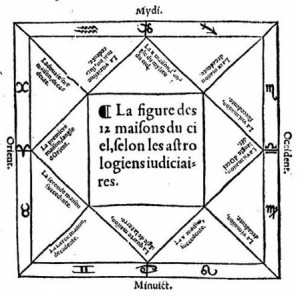 people familiar to powerful people which are respected by many. Mars in the eleventh place, in its dignity and joined to the Moon, makes big chiefs, powerful and fearsome leaders. Venus in the eleventh place, if it does not receive afflictions by evil planets, brings a happy marriage, a prosperous, regular and orderly life, welfare and, over time, success. In this place Venus means men of genuine character and lovable but if it is in a vespertine position, observed from the evil, it makes unhappy marriages and generates sterile people, or those who have no offspring. The star of Mercury in the eleventh place indicates those who practise a discipline. Mercury, at its morning or vespertine rising [21], makes those who live on letters and education, which have a long life and a happy offspring. They follow different activities and, with the passing of time, increase their standard of living.
people familiar to powerful people which are respected by many. Mars in the eleventh place, in its dignity and joined to the Moon, makes big chiefs, powerful and fearsome leaders. Venus in the eleventh place, if it does not receive afflictions by evil planets, brings a happy marriage, a prosperous, regular and orderly life, welfare and, over time, success. In this place Venus means men of genuine character and lovable but if it is in a vespertine position, observed from the evil, it makes unhappy marriages and generates sterile people, or those who have no offspring. The star of Mercury in the eleventh place indicates those who practise a discipline. Mercury, at its morning or vespertine rising [21], makes those who live on letters and education, which have a long life and a happy offspring. They follow different activities and, with the passing of time, increase their standard of living.
The Twelfth House
The Twelfth place ascends before the horoscope, and it is called the interval between the two worlds [22] and also the “evil genius”. He teaches on diseases, parturition, enemies, male servants, on quadrupeds (on domestic pets and large animals) and on what happens before the time of delivery, both to the mother and the unborn child. Saturn is assigned to this place because after the water breaking it separates the child from the mother, and because the woman giving birth is between life and death. In this place the evil stars create a difficult birth, wounds, bodily defects and diseases of the mouth, feet or fingers.
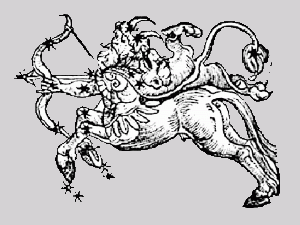 Saturn rejoices (it is in its joy) in twelfth place and in diurnal birth chart, in male sign, it makes those who dominate their enemies, who tyrannize and boast about their actions. It indicates the prefects, those who have authority and act with vigor and severity, which have a despotic character. If the Sun is in twelfth place it means the exile of the father and, in general, it weakens the father with diseases or infirmities or misfortunes, or even it reveals to us a father slaved for his humble origin, because of poverty or a disgrace; it indicates that the native has no prestige, with no means or he lives in indigent conditions. The Moon in the Twelfth place indicates a mother who can be humble, servant or impoverished or insignificant. If an evil star observes the moon in this place it makes the mother subject to diseases or a short life. The Moon in this place makes, as a rule, those who are not
Saturn rejoices (it is in its joy) in twelfth place and in diurnal birth chart, in male sign, it makes those who dominate their enemies, who tyrannize and boast about their actions. It indicates the prefects, those who have authority and act with vigor and severity, which have a despotic character. If the Sun is in twelfth place it means the exile of the father and, in general, it weakens the father with diseases or infirmities or misfortunes, or even it reveals to us a father slaved for his humble origin, because of poverty or a disgrace; it indicates that the native has no prestige, with no means or he lives in indigent conditions. The Moon in the Twelfth place indicates a mother who can be humble, servant or impoverished or insignificant. If an evil star observes the moon in this place it makes the mother subject to diseases or a short life. The Moon in this place makes, as a rule, those who are not 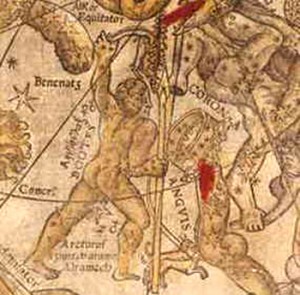 successful, those who are poor and unfortunate. Jupiter in this place indicates that the enemies raise up against the native, they produce quarrels, battles, disputes against their superiors and the decline of the paternal heritage; however, it brings benefits from the servants and quadrupeds. The star of Mars brings afflictions and difficulties as for the servants and quadrupeds and it causes quarrels, treachery and betrayal of the servants. Venus in the Twelfth place makes those who suffer afflictions and distress due to women and those who are overwhelmed by the loving passions and soul suffering. Mercury in the Twelfth place produces thieves, slanderers, those acting fraudulently, those who sue lawsuit to achieve an unlawful purpose, those who are fraudulent and the dissemblers. If Mercury in this place, in some cases, depending on the nature of the signs and the configuration to other celestial bodies, it makes those who deal with many things, officials, teachers, surveyors, interpreters, lawyers, scholars, rhetoricians.
successful, those who are poor and unfortunate. Jupiter in this place indicates that the enemies raise up against the native, they produce quarrels, battles, disputes against their superiors and the decline of the paternal heritage; however, it brings benefits from the servants and quadrupeds. The star of Mars brings afflictions and difficulties as for the servants and quadrupeds and it causes quarrels, treachery and betrayal of the servants. Venus in the Twelfth place makes those who suffer afflictions and distress due to women and those who are overwhelmed by the loving passions and soul suffering. Mercury in the Twelfth place produces thieves, slanderers, those acting fraudulently, those who sue lawsuit to achieve an unlawful purpose, those who are fraudulent and the dissemblers. If Mercury in this place, in some cases, depending on the nature of the signs and the configuration to other celestial bodies, it makes those who deal with many things, officials, teachers, surveyors, interpreters, lawyers, scholars, rhetoricians.
On houses, angles, body and soul
The angular places declare something that express with strength, while the succedent places consolidate and establish the order, finally, the falling places express the changes, the decay, the ceaseless change of things and of human events. Therefore, the strongest places are the angular ones, then the succedent ones and finally the cadent places. The Angular House “expresses 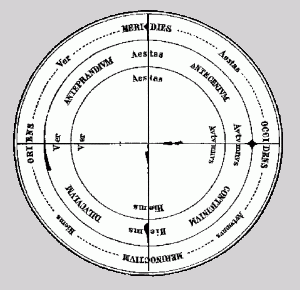 a strong meaning,” the Succedent House “confirms its meaning”, the Cadent house “indicates the loss of the original meaning in order to leave space to different meanings.” In a ternary rhythm the strong time is the first time that is like “the soldier who enters and conquers the city with his army “; the second time represents “the civil organization and the judge who creates the law”; the third time is the stage of “development of trade that unfolds and where resources are distributed and spread.” In the examination of the seasons and time, which is expressed in the annual path of the Sun, in the three months that make up each season, the first month “is established with force,” the meaning of a specific season, in the second month “it is established and confirmed”, in the third month “it dissolves” to prepare the nature and significance of the next season. We observe the ternary rhythm [23], in the subdivision of the zodiac signs (Tropical, Solid and Bicorporeal), in the manner just described; we observe it in the passing of the 24 hours of the solar day, in the twelve houses (two hours each one), and in all four quadrants, each one consisting of three houses, in which the day is divided: from dawn to noon, from noon to sunset, from sunset to midnight, from midnight to dawn; we also find it in the music theory in the relationship between the first, second and third time, which reflect this dynamics “of presenting oneself strongly and dominate, of keeping the strength and failing it”.
a strong meaning,” the Succedent House “confirms its meaning”, the Cadent house “indicates the loss of the original meaning in order to leave space to different meanings.” In a ternary rhythm the strong time is the first time that is like “the soldier who enters and conquers the city with his army “; the second time represents “the civil organization and the judge who creates the law”; the third time is the stage of “development of trade that unfolds and where resources are distributed and spread.” In the examination of the seasons and time, which is expressed in the annual path of the Sun, in the three months that make up each season, the first month “is established with force,” the meaning of a specific season, in the second month “it is established and confirmed”, in the third month “it dissolves” to prepare the nature and significance of the next season. We observe the ternary rhythm [23], in the subdivision of the zodiac signs (Tropical, Solid and Bicorporeal), in the manner just described; we observe it in the passing of the 24 hours of the solar day, in the twelve houses (two hours each one), and in all four quadrants, each one consisting of three houses, in which the day is divided: from dawn to noon, from noon to sunset, from sunset to midnight, from midnight to dawn; we also find it in the music theory in the relationship between the first, second and third time, which reflect this dynamics “of presenting oneself strongly and dominate, of keeping the strength and failing it”.
In the distinction of 12 houses the angles placed along the horizon line and along the meridian line have a salient value and this in itself means that the presence of these angles in a given Zodiac sign brings with it a judgment. Therefore the fact that the Midheaven or the Horoscope (and consequently the Imum Coeli and the West, in opposite signs) are in a sign, means in itself something regardless of the presence of planets. This is different for the other cusps or angles [24] .
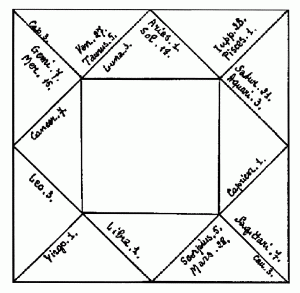 The angular houses indicates the body, those Succedent indicate the body and the soul, those Cadent indicate the soul. The Angular Houses represent the body because the body is what is most visible, what you see first; furthermore, the body is what manifests in early childhood, while the soul qualities manifest later. In the first age, similar to the Angular Houses, a strong development of the body takes place. During the mature age, similar to Succedent Houses, the body and the soul are developed simultaneously. In the last age, similar to the Falling Houses, only the soul develops. Al-Biruni makes a distinction among the quadrants of the Houses (which are described in the Introduction to Astrology of Albumasar) and he declares that the winter quadrant represents body and soul; the second quadrant, the spring quadrant, represents the soul without the body; the summer quadrant, neither body nor soul; the autumnal quadrant, the body without a soul. Al-Biruni also says that for someone the winter quadrant corresponds to the body without a soul, because it is a dark place until it emerges to the light; the spring quadrant corresponds to the soul without the body, because of its rapid ascension; the summer one corresponds neither body nor soul, since it contains the Houses of death and the journey; the autumnal quadrant body and soul, because it is placed between the light and the darkness.
The angular houses indicates the body, those Succedent indicate the body and the soul, those Cadent indicate the soul. The Angular Houses represent the body because the body is what is most visible, what you see first; furthermore, the body is what manifests in early childhood, while the soul qualities manifest later. In the first age, similar to the Angular Houses, a strong development of the body takes place. During the mature age, similar to Succedent Houses, the body and the soul are developed simultaneously. In the last age, similar to the Falling Houses, only the soul develops. Al-Biruni makes a distinction among the quadrants of the Houses (which are described in the Introduction to Astrology of Albumasar) and he declares that the winter quadrant represents body and soul; the second quadrant, the spring quadrant, represents the soul without the body; the summer quadrant, neither body nor soul; the autumnal quadrant, the body without a soul. Al-Biruni also says that for someone the winter quadrant corresponds to the body without a soul, because it is a dark place until it emerges to the light; the spring quadrant corresponds to the soul without the body, because of its rapid ascension; the summer one corresponds neither body nor soul, since it contains the Houses of death and the journey; the autumnal quadrant body and soul, because it is placed between the light and the darkness.
_______________________________________________________________________
Notes
[1] Iamblichus of Chalcis (Chalkida, 245-325), was a Greek philosopher of Syrian origin.(…) He was a student of Porphyry, he opened a Neo-Platonic school in Apamea in Syria. (…) He was a prolific author, but his works are almost all lost. (…) His best known writings are The Life of Pythagoras (the first book of the treatise in ten volumes on Pythagoreanism) and The Mysteries of the Egyptians, published in response to a critical of Porphyry regarding the importance of the mystery rites in the philosophical practice. In it, Iamblichus claims the superiority of theurgy solely on rational inquiry to get a real understanding of the divine world. (From Wikipedia, the free encyclopedia)
[2] Paul of Alexandria was an astronomer, astrologer and philosopher of some importance in the intellectual environment of Alexandria and as such he is remembered by the Suda, the great Byzantine Dictionary of the tenth century. He lived in the fourth century of our era and he belongs to the educated class of Hellenized Egyptians.
[3] Rhetorius was Greek astrologer of the sixth century A.C., a native of Egypt, and a figure of great importance in the history of astrology. He joins together different methods and traditions: Antiochus, Ptolemy, Teucer, Valens, Dorotheus and he is the main intermediary between the late imperial astrology and the Byzantine one. On his huge compendium of astrology, which apparently consists of 118 chapters, mostly published in the appendices of the Catalogus Codicum Astrologorum Graecorum, D. Pingree, Antiochus and Rhetorius, “Classical Philology”, 1977, pp. 203-223. (Information taken from “Rhetorius Of the nature and virtues of the planets”, Giuseppe Bezza in Arcana Mundi, an anthology of ancient astrological thought, pp. 72-86).
[4] Schematic description of the twelve places of Paul of Alexandria – Introduction to the judgments, Ed. AE. Boer, Pauli Alexandrini Elementa apotelesmatica, Leipzig 1958 – ch. 24 – (G. Bezza translation).
Hermes Trismegistus on the names and the strength of the twelve places of Rhetorius – Rhetorii Aegypti capitula selecta, pp. 126-174 (G. Bezza translation).
[5] The astrologers of the past appointed the houses and gave a joy, a “chara” (from “Charai”) to the stars present in these places. In this arrangement all the diurnal planets are in the diurnal hemisphere: the Sun, Saturn and Jupiter; the nocturnal ones are in the night: the Moon, Mars and Venus. Those of the day and night are real “parties” with their own condition, with their own way of being. The diurnal planets are all male, the nocturnal ones are female with the exception of Mars. This description also shows that most fortune or most unfortunate is in the daytime: in fact in the diurnal party there is the most beneficial and the most evil. The places where the stars have their rejoicing are the places that mean something corresponding to these stars: the eleventh place, where Jupiter rejoices, represents the enemies, the supports, the relationships; the fifth place where Venus rejoices, represents the children but also the result of ones own things and substances; the sixth and the twelfth place, where there are the evils, represent the obstacles and the infirmities; the ninth house, where there is the Sun, is the place of faith; but also the third house is the place of faith. Initially the opposite places have similar meanings: so every place can be perceived as to the opposite. Each place can also be perceived as to the angle from which it depends, and from this point of view the division is into four parts because there are four angles. The fourth place is an origin and the tenth is an outcome; the first is a being, the seventh is a “non-being”; we can also say that the first is the subject itself (almost the physical and chemical constitution of the subject) and the seventh instead is what the subject is not, what is lacking to the subject; because man and woman can not exist alone, for this reason they associate or marry.
[6] Hairesis – faction – sect: it is the diurnal or nocturnal condition of a star, its belonging to the faction of the day or night; the harmony between the faction of the ruling planets and the time of birth (day or night) is critical to the judgment. The planets which meet their hairesis (in diurnal birth the diurnal planets, in nocturnal birth the nocturnal planets) perform in the best way, according to nature and justice; those who do not respect their hairesis perform in reverse order, with obstacles and difficulties. The respect for the hairesis does not indicate a greater force of the planet, but a better way to perform. Other conditions of respect for the hairesis are, to be above the horizon, to have growing light and to be in a male sign, for the diurnal planets, whereas for the nocturnal planets the conditions are to be below the horizon, to have a fading light and to be a female sign (explained in the glossary of the website “cieloeterra.it”).
[7] The term procession can be translated as parade. The spearman is who carries the spear and forms the escort for an important figure who needs escort. In the birth chart these figures are the Sun and the Moon. The procession is different if it concerns the Sun or the Moon. If it relates to the Sun the procession occurs in the Eastern part: a star begins to be doryphoros to the Sun just when it begins its heliacal rising. The first rise from the Sun’s rays is the Sun figure. Instead the processions regarding the Moon take place in the following degrees and the star which the Moon applies is similar to that coming out from the Sun’s rays. The processions regarding the Sun of the three superiors can not extend beyond the side of the trine, until the planet is direct, and the most effective processions are those that happen for figure (trine, square, hexagon, heliacal rising), since the star is in angular place, and the star has a dominion on the place of the Sun. If all these conditions are met the procession is very effective and it means a benefit for himself or for his father, and it regards the esteem, the dignity and status in life. However the procession produces a benefit only if the planet is beneficial or if there is evidence of the benefits contributing to it: the procession of Mars to the Sun is not enough if a beneficial does not contribute in some way. If there is no evidence of a beneficial, the procession of Mars to the Sun always means something of Mars (military command, public jobs and so on) but the figure is inferior and it is subject to anomaly, inconstancy. However, the most important condition in procession is that the Spearman has dominion over the Sun. Instead the inferiors can be doryphoros when they are matutine as regards the Sun and if the nativity is diurnal, or they are vespertine if the birth is nocturnal. In the case of Mercury morning rise with retrograde motion, the retrograde motion undoubtedly poses an inferiority element and without a complete benefit from procession. The retrograde motion indicates a decrease, and this decrease is more considerable for Venus than for Mercury. Mercury, unlike Venus, can remain invisible for all its retrogradation arc, and in general when it is matutine and retrograde, it is also invisible, because its visibility requires a large elongation from the Sun; so when it is visible in the morning it is almost always direct. This is not the same for Venus.
Whereas in the case of the Moon the procession is in the following parts, so doryphoros of the Moon are the stars which the Moon applies in astronomical conjuction, in sextile, square, trine aspect, but not opposite: in processions the opposition is not considered. For the Moon procession the fundamental and indispensable condition is therefore the application, and then there are the other conditions such as the Sun, the domain on the luminary, and angularity. In addition the crescent Moon prefers processions of the diurnal ones, the waning Moon prefers processions of the nocturnal ones. The conditions for the full benefit are two: the Doryphoros has dominion and it is angular: if one is missing the procession is not complete, and there is something missing to the prestige; if both are missing very little remains of procession. As for the dominion, the domicile and exaltation must be considered as dignity, whereas the triplicity or the boundary are not effective in this case. (Explanation contained in the website glossary “cieloeterra.it”).
[8] See the contents of the note. 6 on the concept of faction.
[9] The lot of Fortune, Tyche, in each birth chart can represent the body, life, acquisitions, material substances, cohabitation, marriage and what is shared in the couple’s life. Like the Moon, it can express something about the house, the domicile, the place where you live.
[10] The Third and Ninth House separate the humid-ascendant from the dry-descendant and they indicate actual changes in the physical world, for this they are called “intervals calls between the two worlds.”
[11] The expression “in its own face” or “in his own person” means the almugea. Almugea or Idioprosopia is the figure of a star compared to the Sun or the Moon when it is in a sign that, in the same direction, is far from the sign in which the luminary is as much as its own diurnal house is far from Leo in the case of the Sun, or its own nocturnal house is far from Cancer in the case of the Moon. For example, Mercury in Aries is idioprosopo to the Sun in Pisces and to the Moon in Taurus; Venus in Aries is idioprosopo to the Sun in Aquarius and to the Moon in Gemini; Mars in Aries is idioprosopo to the Sun in Capricorn and to the Moon in Cancer, and so on.
[12] When the Sun is rising, at the Eastern degree, the stars of the first and third quadrants are matutine, and those of the second and fourth quadrants are vespertine. See the comment to Ptolemy of ‘Alī ibn Ridwan, p. 868 of “Arcana Mundi”, Giuseppe Bezza, 1995.
[13] See the content of the previous note.
[14] The Sixth and Twelfth House are called “intervals between the two worlds” because they separate day from night.
[15] “By drawing a line between the position of the Sun and its opposite point, there are two semicircles. The one that precedes the Sun in the diurnal motion is the Eastern hemicycle in which, for the diurnal clockwise motion (which goes in the direction of the clock hands according to the astrological regular scheme), all planets arise, culminate or fade before the Sun and they are said Eastern – right -. The hemicycle following the Sun in the diurnal motion is the western semicircle and all the planets arise, culminate and fade after the Sun and are called the Western – left -. “(Ref. To chapter 45, paragraph” Eastern and Western Stars ” of the 4th class online – the motion and visibility of the planets, by Giuseppe Bezza and Marco Fumagalli).
[16] The Ninth and Third House separate the ascendant-humid hemicycle from the descendant-dry one and they indicate actual changes in the physical world; for this they are called “intervals between the two worlds.”
[17] Wizards, conjurers of souls.
[18] In the luminous cycle of the planet compared with the Sun, this is the time (determined for a given local horizon) in which the planet comes out from the Sun rays and appears visible (heliacal rising), and when the planet is still visible and is about to get under the Sun rays (heliacal sunset). In these two phases it is achieved the maximum activity of the planet as it has rapid motion and the maximum light.
[19] See the content of the previous note.
[20] See the content of the note. 6 on the concept of hairesis or faction.
[18] In the luminous cycle of the planet compared with the Sun, this is the time (determined for a given local horizon) in which the planet comes out from the Sun rays and appears visible (heliacal rising), and when the planet is still visible and is about to get under the Sun rays (heliacal sunset). In these two phases it is achieved the maximum activity of the planet as it has rapid motion and the maximum light.
[22] The Twelfth and Sixth House are called “intervals between the two worlds” because they separate day from night.
[23] There are reports of ternary cycle from the Persians. Stephen of Byzantium speaks about it (Sixth century AD), and later, the whole subject is systematized and we find the description in the Arabic astrological literature.
[24] Here there are some considerations on the division of places by Placidus de Titis, taken from his work “Coelestis Philosophia 2, 7″ – Of the division of twelve houses “(G. Bezza translation). Placidus clarifies that there are many conflicting opinions, and he makes an analysis of the useful elements that can grasp “the intimate truth of the matter”. After setting out the various procedures of various “experts of the art,” he expresses his conclusions that here we report, but also we make reference, for those who want to study in depth the matter, the full text which is available on the website Cielo e Terra:
“(…) First conclusion. The division of the houses, in order to be natural, must be accomplished by parties which are proportional.
(…) Second conclusion. It is not enough that the houses are equal to each other with respect to a single circle, be it the equator or the circle of the signs or the vertical circle or any other main circle assumed for the division. Indeed it is necessary that the houses are divided on the basis of a proportional division, apart from this or that circle.
(…) Third conclusion. The distribution of the houses must always remain constant and in the same amount in any horizon.
(…) Fourth conclusion. The division of the houses, in order to be natural, must be a result of the division of the influence of the stars, not the space of the sky or the atmosphere around us.
(…) Fifth conclusion. The points on the horizon and on the meridian from which the lines for the division of the celestial tasks must be carried out are the points where the stars arise and pass the meridian.
(…) Sixth conclusion. The first division of the world must be carried out into four quadrants.
(…) Seventh conclusion. These four parts are made and defined by two great circles, the horizon and the meridian.
(…) Eighth conclusion. The allocation of the houses, in order to be natural, must be carried out for the double temporal hours of the places and of the stars, or by a proportional division of the motions or, if we prefer, of mobile arcs from one angle to another. (…)”
